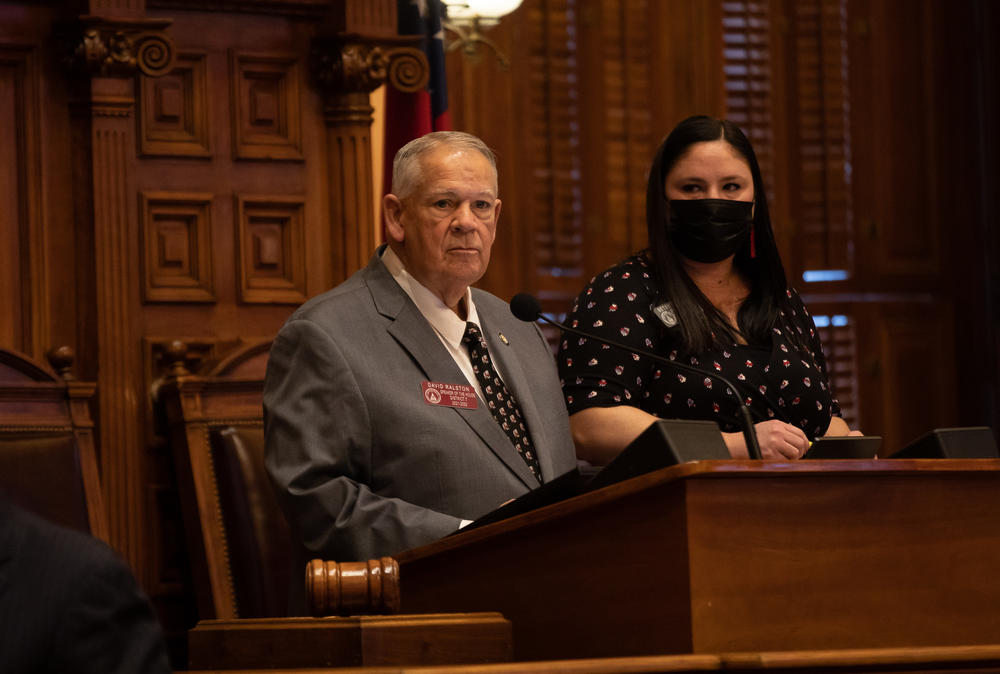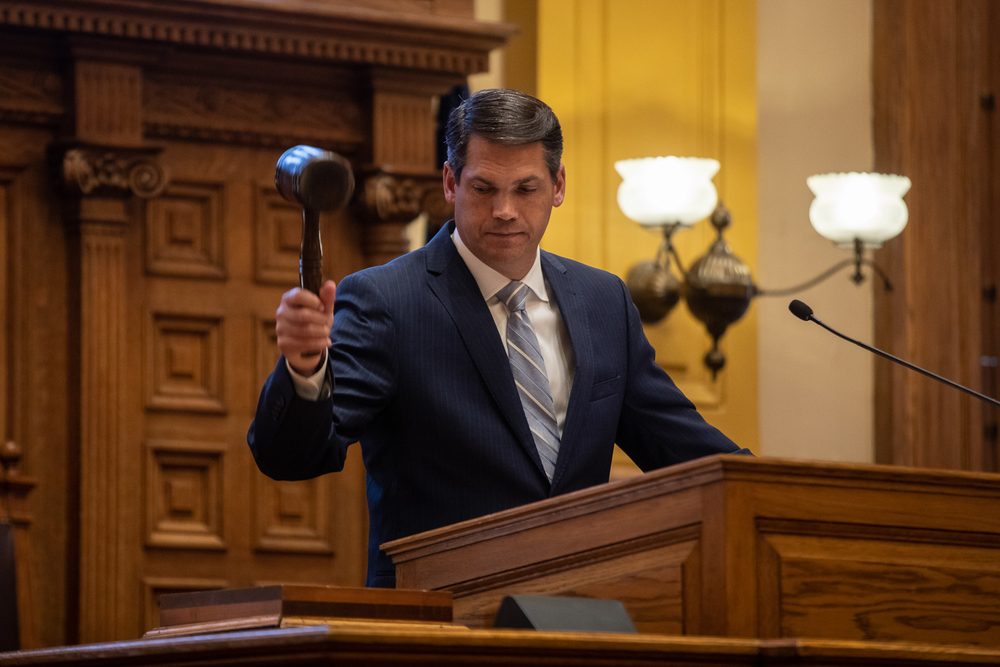
Caption
House Speaker David Ralston (R-Blue Ridge) speaks on the first day of the 2022 legislative session.
Credit: Riley Bunch | GPB News

House Speaker David Ralston (R-Blue Ridge) speaks on the first day of the 2022 legislative session.
Georgia’s legislative leadership has a lengthy check list of action items for this legislative session — from bolstering mental health access to prioritizing foster care reform.
But just months before statewide elections, complicated by a bitter rift within the Republican Party, time under the Gold Dome will likely be dominated by extreme proposals aimed to curry favor with voters.
The chaotic political atmosphere of 2022 is marked by a battle raging within the GOP between members who are still loyal to Donald Trump and those who have lost favor with the former president.
Redistricting ensures Democrats have a slim chance at taking control of either chamber for several years, but policies proposed during the session will likely set the tone for campaigns in the coming months on both sides.
With more than a dozen lawmakers eyeing higher office, political pundits warn Georgians to keep motives in the back of their minds.
“Whatever one sees playing out in the legislature probably should step back and say, ‘Okay, … is this being motivated by someone's efforts to better position themselves or their ally for the upcoming elections?’” said Dr. Charles Bullock, political science professor at the University of Georgia.

Lt. Gov. Geoff Duncan pounds the gavel in the Georgia State Senate on the first day of the 2022 legislative session on Jan. 10, 2022.
In press conferences last week, House Speaker David Ralston (R-Blue Ridge) and Lt. Gov. Geoff Duncan outlined ambitious agendas for the upcoming session. Both noted proposals intend to tackle the rise in violent crime being seen across the state.
When asked if he was concerned that lawmakers will use the lectern to bolster campaign platforms, Ralston’s message was straightforward. “I don’t intend to let it,” he said.
“I think I've been pretty clear about that,” Ralston said. “We've got some important things to get done — public safety, mental health, the budget. These are things that I think we can make a difference in the lives of Georgians in doing. I'm not going to be distracted by what other people are doing in their campaigns.”
Although Gov. Brian Kemp will reveal his legislative priorities later this week in his State of the State address, a few of them are all but certain: a state budget that includes pay raises for teachers and state employees, changes to Georgia’s education system and legislation to expand gun rights.
But Kemp, too, faces a bitter primary challenge from Trump-backed former Sen. David Perdue, who has pushed far-right proposals around education, elections and income taxes in the opening weeks of his campaign.
Bullock said the primary battle could result in Kemp’s priorities shifting rightward as well.
Last week, the governor endorsed so-called “constitutional carry” legislation that would allow gun owners to carry firearms without a permit, potentially joining more than 20 other states with similar laws.
The infighting within the Republican Party will be on full display in the state senate.
Duncan is not seeking a second term as lieutenant governor, and Senate President Pro Tem Butch Miller (R-Gainesville) and Sen. Burt Jones (R-Jackson) are frontrunners locked in a tight primary battle to lead the chamber next year.
“It may be a situation where one makes a conservative proposal and the other says, ‘I'll see you and raise you by five,” Bullock said.
Already, Miller and Jones have leaned into dueling base-pleasing proposals, from fully eliminating the state’s income tax that funds half the state’s budget to undoing election laws and processes they themselves voted to approve in recent legislative sessions.
Bullock said Trump’s entry into the primary, endorsing several challengers, creates a dynamic this year that “creates an incentive for these candidates to move to the right.”
Duncan’s control over his chamber will be tested more than ever this session. The two-term lieutenant governor has been outspoken against the far-right faction of the GOP that has fallen in line behind Trump.
“You’re certainly always concerned about folks that deliver legislation into this body only for political purposes and for headlines,” Duncan said. “That certainly is not a healthy place, I believe, to make laws. I believe it creates a divide.”
The election-year fight over social and economic issues that won’t likely become law may dominate committee meetings and floor sessions, despite leaderships’ best efforts to take a higher road.
Lawmakers from both sides of the aisle have teed-up bills that have little chance of doing more than exciting their voters and outraging opponents.
Those proposals range from banning so-called “Critical Race Theory” in schools to full Medicaid expansion and dueling ideas about how to reshape Georgia’s election laws.
A pending battle over Buckhead cityhood has been championed by GOP lawmakers from outside the area in question.
After the 2020 election saw Democrats win the state’s presidential votes for the first time in three decades and January 2021 saw two Democrats get elected to the U.S. Senate, the legislature spent much of the 2021 session working on a massive overhaul of Georgia election code.
The 98-page SB 202 that passed currently faces eight different lawsuits challenging parts of the law — and some Republicans still want to make more changes.
Still, in a closely divided state at the center of the political universe this year, leaders such as Ralston said they will forge ahead with what they believe is best for all Georgians.
“I know that many of the bills, particularly this year, they're designed to get your attention and for you to give them coverage,” Ralston said. “To the extent that they succeed, I guess they'll keep doing it. But you know, I've got a job to do and I'm going to do my job.”